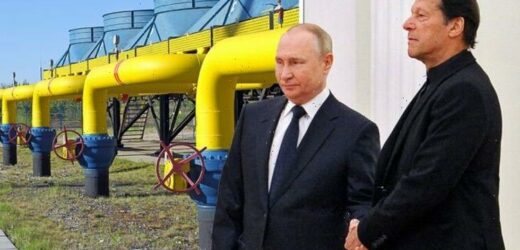Ukraine: Russia and Belarus are ‘two aggressors’ says Pabriks
We use your sign-up to provide content in ways you’ve consented to and to improve our understanding of you. This may include adverts from us and 3rd parties based on our understanding. You can unsubscribe at any time. More info
Pakistani Prime Minister Imran Khan announced that he struck a deal with Putin to import natural gas, as well as 2 million tons of wheat from his Russian counterpart. Mr Khan said that the pair suggested the pair had “great discussions” on his visit to the Moscow last week, where the leaders signed a bilateral agreement. Pakistan’s Prime Minister said: “We went there because we have to import 2 million tons of wheat from Russia.
“Inshallah (God willing), the time will tell that we have had great discussions.”
But the partnership has raised eyebrows as the West has distanced itself from Russia as has been taking harsh action towards it over its “full-scale invasion” of Ukraine.
Bella Wallersteiner, a political commentator, wrote on Twitter: “Pakistan says it will import 2 million tons of wheat and natural gas from Russia. Welcome to the new world order folks! Worth also mentioning that Pakistan is the largest recipient of our foreign aid, at £305 million in 2019. Money well spent?”
Pakistan has been the Department for International Development’s (DFID) largest country programme for the last five years and was expected to amount to £302million in 2019/20
UK aid to Pakistan in 2018/19 saw 29 percent spent on economic development, which could raise concerns that British money may indirectly fund Russian supplies in the future.


Mr Khan is said to be ready to push for the construction of a long-delayed, multi-billion-dollar gas pipeline to be built in collaboration with Russian companies.
Pakistan’s energy ministry spokesman said: “Both countries are eager to launch the project at the earliest.”
The 1,100 km (683 mile)-long Pakistan Stream pipeline, was initially agreed to in 2015 and was to be financed by both Moscow and Islamabad, using a Russian company to construct it.
This comes as Russia has also struck a deal China to export a record amount of natural gas to the country.
Russian energy giant Gazprom has reportedly signed a contract to design the Soyuz Vostok pipeline across Mongolia toward China.

The statement said that this new pipeline “will be a continuation of the Russian gas pipeline Power of Siberia – 2”, another gas project connecting the two countries.
Once agreed upon, a new contract will allow the supply of up to 50 billion cubic meters of Russian gas per year to China.
This also comes after the EU has been pushing to slash its energy ties with Russia after fearing the Russian President would cut its gas as revenge for the harsh Western sanctions.
Berlin pledged to not certify Nord Stream 2, an £8billion pipeline stretching 750 miles that would have sent Russian gas to Germany.
Russia claimed that the pipeline would have doubled gas volumes travelling to Europe once operational.
DON’T MISS
Erdogan ties with Putin in tatters after nuclear threat [REVEAL]
Pakistan hammers nail into West’s Russia response with new gas deal [REPORT]
Biden humiliated as Putin set for major new energy deal [INSIGHT]

At present, Russia supplies 40 percent of Europe’s natural gas, a third of which travels through Ukraine via pipelines.
The EU also imports 35 percent of its crude oil and more than 40 percent of its coal from Russia.
Now, the EU is looking at boosting trade with other exporters of liquified natural gas (LNG) to reduce reliance on Russia as a trading partner.
And Russia’s energy sector has also taken a blow after two major energy giants pulled out of Russian projects.

Energy giant Shell announced it would put an end to all joint-ventures with Gazprom, including pulling out of Nord Stream 2, which it is thought to have contributed £750million towards.
It also withdrew its 27.5 stake in a major liquefied natural (LNG) gas plant Sakhalin-II, as well as a 50 percent stake in the Salym Petroleum Development and the Gydan energy venture.
BP has also announced it would abandon its nearly 20 percent stake in the Russian oil giant Rosneft.
According to some estimates, the move could cost Russia around £18billion.
Source: Read Full Article


